广东省深圳市Module 3 Unit 5 Save the endangered animals More paractice 课件
文档属性
| 名称 | 广东省深圳市Module 3 Unit 5 Save the endangered animals More paractice 课件 | 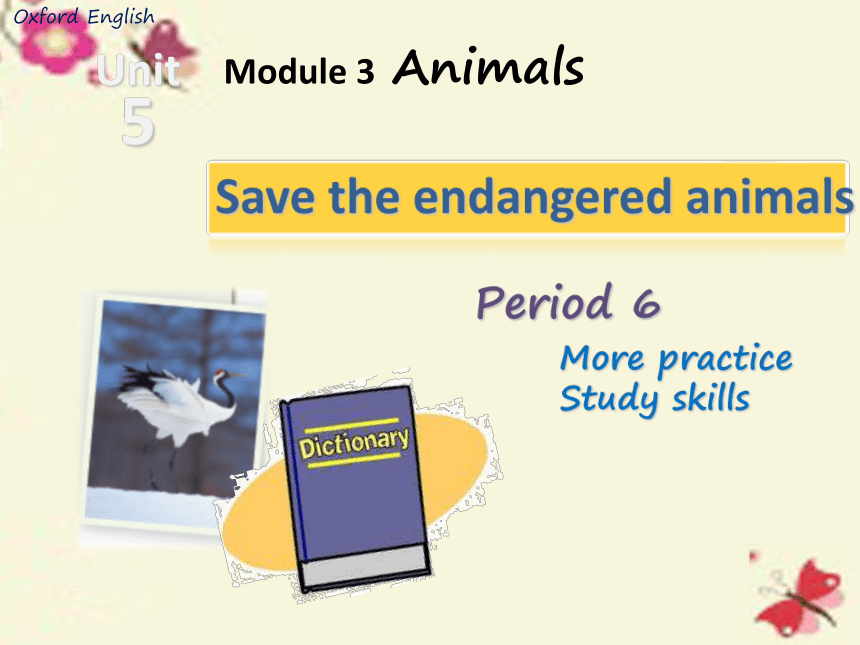 | |
| 格式 | zip | ||
| 文件大小 | 3.9MB | ||
| 资源类型 | 教案 | ||
| 版本资源 | 牛津深圳版 | ||
| 科目 | 英语 | ||
| 更新时间 | 2017-07-26 00:00:00 | ||
图片预览

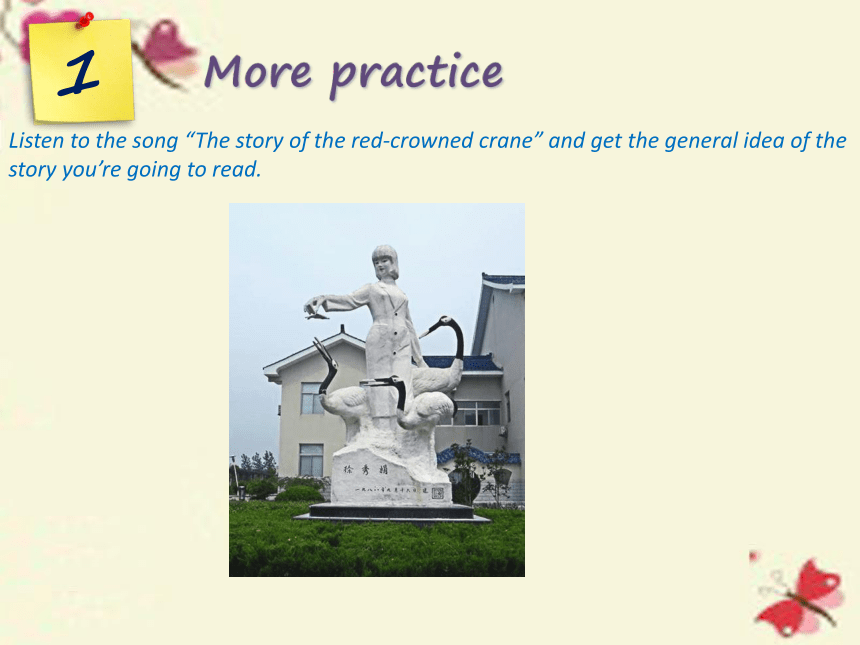
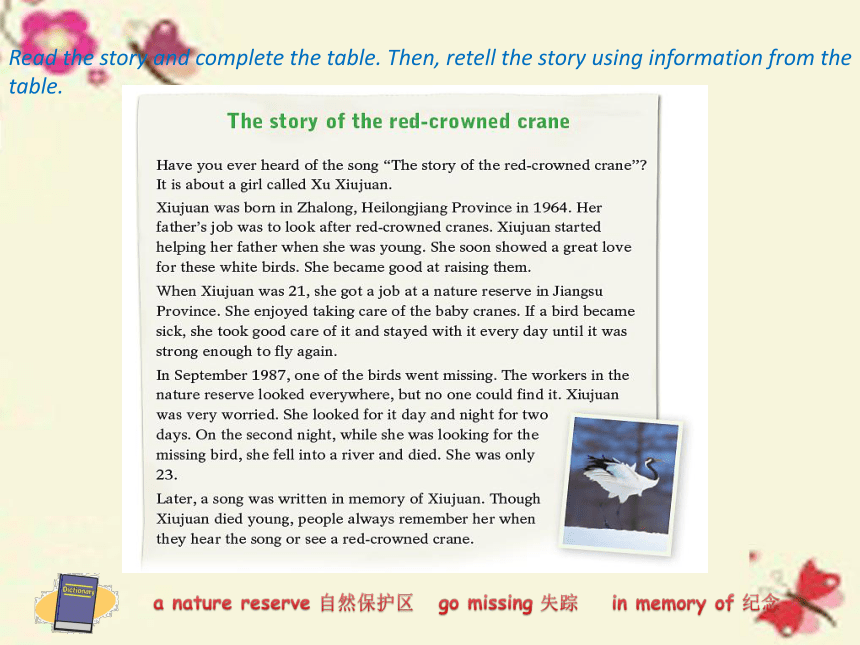
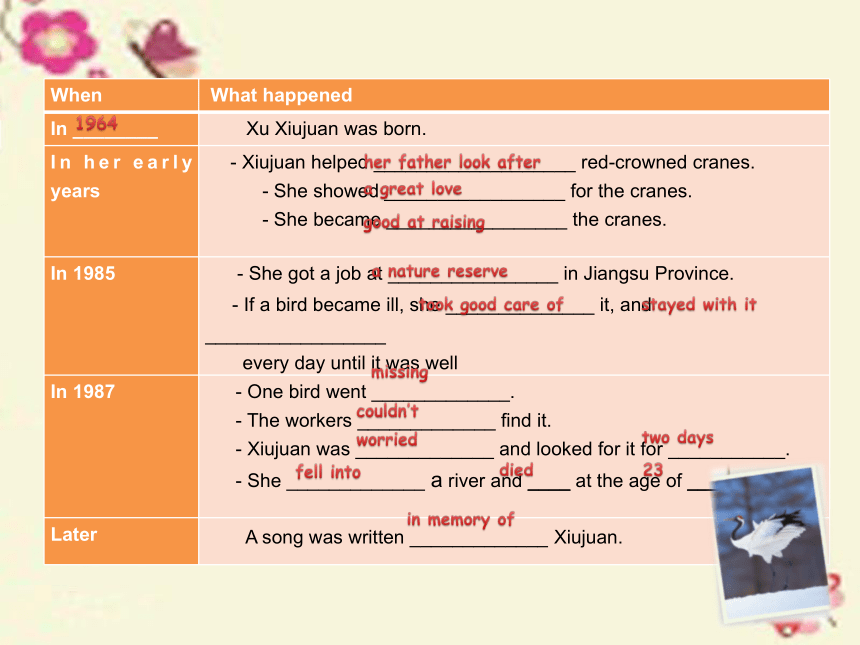
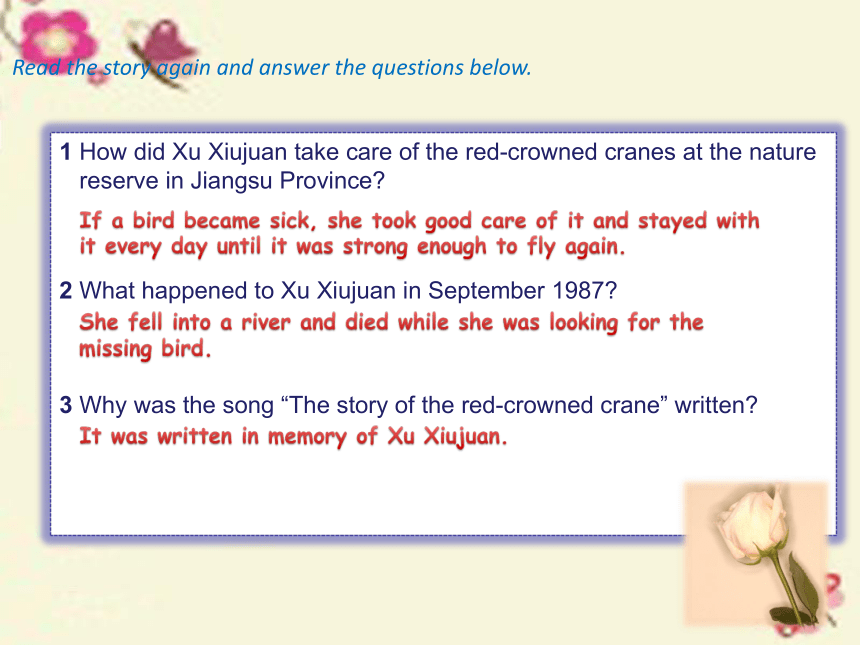
文档简介
课件11张PPT。Unit
5Oxford EnglishModule 3 AnimalsPeriod 6More practice
Study skillsSave the endangered animals1More practiceListen to the song “The story of the red-crowned crane” and get the general idea of the story you’re going to read.Read the story and complete the table. Then, retell the story using information from the table.a nature reserve 自然保护区 go missing 失踪 in memory of 纪念1964her father look aftera great lovegood at raisinga nature reserve took good care ofstayed with itmissingcouldn’tworriedtwo daysfell intodied23 in memory ofRead the story again and answer the questions below.1 How did Xu Xiujuan take care of the red-crowned cranes at the nature
reserve in Jiangsu Province?
2 What happened to Xu Xiujuan in September 1987?
3 Why was the song “The story of the red-crowned crane” written?
If a bird became sick, she took good care of it and stayed with it every day until it was strong enough to fly again.She fell into a river and died while she was looking for the missing bird.It was written in memory of Xu Xiujuan.Study skills2Using reference books (4): Using a dictionary (II)
A dictionary not only tells you the most common meaning of a word, it
also tells you:
? how to spell and say the word;
? if it is a noun, a verb, etc.;
? if the word has more than one meaning;
? how we might use it in a sentence.A In groups, look at the dictionary page below and answer the questions on page 79.1 How many different meanings of “can” are given in the
dictionary?
__________________________________________________
2 What are the two pronunciations of the word?
__________________________________________________
3 Why are some words in italics?
__________________________________________________
4 What do the abbreviations “v”, “n”, “sing.”, “C”, “BrE”
and “AmE” mean?
__________________________________________________
__________________________________________________
__________________________________________________
5 What do the words “informal” and “slang” mean?
__________________________________________________
__________________________________________________
__________________________________________________
6 What idioms are given?
__________________________________________________Eight.They are /k?n/ and /k?n/.Because they are examples.The abbreviation “v” means “verb”; “n” means “noun”; “sing.”means “singular”; “C” means “countable noun”; “BrE” means “British English”; “AmE” means “American English”.The word “informal” means “suitable for normal conversation and writing to friends rather than for serious speech and letters”; “slang” means “very informal language and expressions”.The idioms are “no can do” and “a can of worms”.*B Use your dictionary to answer the following questions. Compare your answers with
your classmates’.1 What is the pronunciation of “record” as a verb? What is it as a noun?
2 What is the British English pronunciation of “vase”? What is its American English pronunciation?
3 From your dictionary, find an example sentence for the word “trip”.
4 What is the American English for “autumn”?
5 What does “room” mean as a countable noun? What does it mean as an uncountable noun?
6 What does the idiom “let the cat out of the bag” mean?/r??k?:d/. /?rek?:d/./v??z/. /ve?s/ or /ve?z/.(Possible answer) We went on a trip to the mountains.Fall.As a countable noun, it means “a part of a building that has its own walls,
floor and ceiling and is usually used for a particular purpose”. As an uncountable noun, it means “empty space that can be used for a particular purpose”.It means “to tell a secret carelessly or by mistake”.3Self-assessmentHHomework 利用图书馆或互联网等资源寻找有关保护濒危动物的真人真事,准备口头汇报。
选择性完成《英语(八年级 下册)B》第92至95页Integration的练习。
5Oxford EnglishModule 3 AnimalsPeriod 6More practice
Study skillsSave the endangered animals1More practiceListen to the song “The story of the red-crowned crane” and get the general idea of the story you’re going to read.Read the story and complete the table. Then, retell the story using information from the table.a nature reserve 自然保护区 go missing 失踪 in memory of 纪念1964her father look aftera great lovegood at raisinga nature reserve took good care ofstayed with itmissingcouldn’tworriedtwo daysfell intodied23 in memory ofRead the story again and answer the questions below.1 How did Xu Xiujuan take care of the red-crowned cranes at the nature
reserve in Jiangsu Province?
2 What happened to Xu Xiujuan in September 1987?
3 Why was the song “The story of the red-crowned crane” written?
If a bird became sick, she took good care of it and stayed with it every day until it was strong enough to fly again.She fell into a river and died while she was looking for the missing bird.It was written in memory of Xu Xiujuan.Study skills2Using reference books (4): Using a dictionary (II)
A dictionary not only tells you the most common meaning of a word, it
also tells you:
? how to spell and say the word;
? if it is a noun, a verb, etc.;
? if the word has more than one meaning;
? how we might use it in a sentence.A In groups, look at the dictionary page below and answer the questions on page 79.1 How many different meanings of “can” are given in the
dictionary?
__________________________________________________
2 What are the two pronunciations of the word?
__________________________________________________
3 Why are some words in italics?
__________________________________________________
4 What do the abbreviations “v”, “n”, “sing.”, “C”, “BrE”
and “AmE” mean?
__________________________________________________
__________________________________________________
__________________________________________________
5 What do the words “informal” and “slang” mean?
__________________________________________________
__________________________________________________
__________________________________________________
6 What idioms are given?
__________________________________________________Eight.They are /k?n/ and /k?n/.Because they are examples.The abbreviation “v” means “verb”; “n” means “noun”; “sing.”means “singular”; “C” means “countable noun”; “BrE” means “British English”; “AmE” means “American English”.The word “informal” means “suitable for normal conversation and writing to friends rather than for serious speech and letters”; “slang” means “very informal language and expressions”.The idioms are “no can do” and “a can of worms”.*B Use your dictionary to answer the following questions. Compare your answers with
your classmates’.1 What is the pronunciation of “record” as a verb? What is it as a noun?
2 What is the British English pronunciation of “vase”? What is its American English pronunciation?
3 From your dictionary, find an example sentence for the word “trip”.
4 What is the American English for “autumn”?
5 What does “room” mean as a countable noun? What does it mean as an uncountable noun?
6 What does the idiom “let the cat out of the bag” mean?/r??k?:d/. /?rek?:d/./v??z/. /ve?s/ or /ve?z/.(Possible answer) We went on a trip to the mountains.Fall.As a countable noun, it means “a part of a building that has its own walls,
floor and ceiling and is usually used for a particular purpose”. As an uncountable noun, it means “empty space that can be used for a particular purpose”.It means “to tell a secret carelessly or by mistake”.3Self-assessmentHHomework 利用图书馆或互联网等资源寻找有关保护濒危动物的真人真事,准备口头汇报。
选择性完成《英语(八年级 下册)B》第92至95页Integration的练习。
同课章节目录
